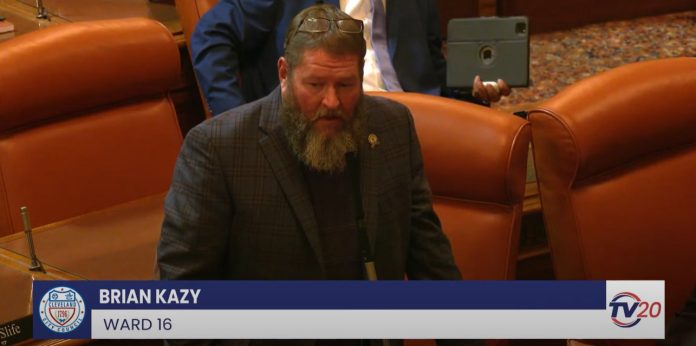Cleveland Mayor Justin Bibb announced a $100 million agreement with the Haslam Sports Group on October 13, drawing sharp criticism from several city council members during their meeting the following evening.
Councilman Brian Kazy delivered the harshest rebuke, telling Bibb directly during the meeting that residents felt betrayed by the deal. Comparing the announcement to the pain Cleveland felt when Art Modell moved the Browns in 1995, Kazy told the mayor: “You have lied with the dogs and now you have fleas.”
The deal clears the way for the Browns to build a new domed stadium in Brook Park while providing funds for lakefront development and demolition of the current Huntington Bank Field. However, council members raised concerns about whether the agreement adequately compensates Cleveland residents for the loss of the downtown stadium.
Council President Blaine Griffin expressed disappointment with the settlement, noting that lawmakers are exploring their legal obligations before any vote on the matter.
Councilman Christopher Harsh questioned the financial mathematics of the deal. The agreement includes a $25 million payment by December 1, an estimated $30 million for stadium demolition, $5 million annually from 2029 through 2033, and $2 million per year for community projects from 2029 through 2038.
Harsh noted the stadium’s demolition must begin by 2029, and expressed concern that the estimated $30 million cost falls short of what demolition will actually require.
Councilman Michael Polensek, the only remaining council member from the original Browns stadium deal in the 1990s, criticized the financial structure. He calculated that accounting for inflation over the 20-year payment period, the $100 million becomes approximately $60 million in present value. After deducting demolition costs, he argued Cleveland would wind up with little benefit.
Polensek noted the original stadium cost over $500 million, with total infrastructure investments potentially reaching $700 million. He requested a detailed spreadsheet showing how city officials arrived at their numbers.
Kazy said his phone had been blowing up with calls from residents asking why the mayor didn’t continue the fight. He said he hoped Bibb could sleep at night knowing many Cleveland residents believe he sold out.
Councilman Kevin Conwell supported calls for detailed financial documentation, saying the administration should provide spreadsheets showing how they reached their conclusions rather than just verbal presentations.
The agreement still requires approval from Cleveland City Council, and both parties will voluntarily dismiss all lawsuits related to the Browns’ move to Brook Park.
EMS celebrates 50 years
Before the contentious stadium discussion, council celebrated a milestone: the 50th anniversary of Cleveland’s Division of Emergency Medical Services.
The celebration honored the legacy of former Councilwoman Mary Zone, who championed the creation of Cleveland EMS after her husband died from a heart attack in 1974 when emergency response took 52 minutes.
Former Councilman Matt Zone, Mary’s son, described how his mother made EMS her mission when she joined council following his father’s death. The first EMS academy graduated on October 14, 1975.
EMS Commissioner Orlando Wheeler thanked council and Mayor Bibb for supporting innovative programs that have placed Cleveland at the cutting edge of prehospital care.
Dr. Jeremiah Escada, the newly appointed medical director, highlighted recent advancements including whole blood administration for trauma patients, implemented in June. He noted EMS is changing medicine in the streets before patients reach hospitals.
Lee Nathans, who wrote the original grant and served as the first EMS director, recalled his promise to Mary Zone to establish an excellent emergency medical service not diluted by other city departments.
Public concerns raised
During public comment, residents addressed housing issues, property taxes, and ongoing concerns about the Garden Valley explosion.
Bridget Smith Jackson returned to discuss the explosion that displaced more than 150 residents and 44 families nearly four months ago. She criticized the lack of coordinated response and called for a citywide crisis response plan.
Austeja Everson spoke about residents in Garden Valley and surrounding neighborhoods feeling unheard and unseen, particularly referencing families affected by the explosion who left a previous meeting in tears.
Dartanian Brown from Slavic Village Development Corporation urged council to support remediation of the Harvard Landfill site, which has funding available for a solar farm project that could reduce environmental impact on nearby residents.
John Francis and other Ward 11 residents called for officially tabling legislation related to a former gas station parcel, expressing concern it could be reintroduced at any time against community wishes.













